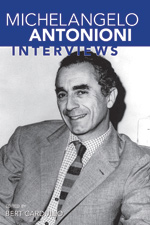(University Press of Mississippi, $22.00)
Edited by Bert Cardullo
 When he died last year within 24 hours of Ingmar Bergman, it seemed to many that Michelangelo Antonioni got the short end of the stick in the many double or side-by-side obits that followed their passing. Bergman had all the big themes—God, death, insanity, betrayal. But his innovations were narrative and thematic, where Antonioni’s were largely in the formal realm. His portraits of modern urban alienation, with their deliberate pacing, blank performances, startling camerawork and editing, were often accused of modishness and pretension, which at a half-century’s distance seems unfair. But having suffered a debilitating stroke in the late 1980s, Antonioni wasn’t really able to defend his work as it ripened and began to stand outside of the era in which it was created.
When he died last year within 24 hours of Ingmar Bergman, it seemed to many that Michelangelo Antonioni got the short end of the stick in the many double or side-by-side obits that followed their passing. Bergman had all the big themes—God, death, insanity, betrayal. But his innovations were narrative and thematic, where Antonioni’s were largely in the formal realm. His portraits of modern urban alienation, with their deliberate pacing, blank performances, startling camerawork and editing, were often accused of modishness and pretension, which at a half-century’s distance seems unfair. But having suffered a debilitating stroke in the late 1980s, Antonioni wasn’t really able to defend his work as it ripened and began to stand outside of the era in which it was created.
Therefore, one warmly welcomes the University of Mississippi Press’ collection of interviews with il maestro. Conducted between 1960, the year L’Avventura was simultaneously feted and booed by the Cannes audience, and 1983, when his career had slowed down considerably, they demonstrate that Antonioni was, then as now, always one step ahead of his critics and interrogators.
Antonioni reorients interviewers to his own worldview, which is both simple and complex. He talks of his essential practicality at work. Against conventional Italian practice, he embraced direct sound rather than post-dubbing and said, “I can’t imagine a director who would leave [framing and composition] to other people.” He abhorred Method actors. (“They’re absolutely terrible. They want to direct themselves, and it’s a disaster.”) Above all, the purity of a film’s intentions was paramount to him. “I never think of the public. I think of the film.”
Review written by John Patterson.